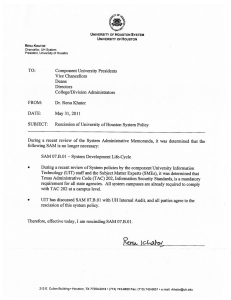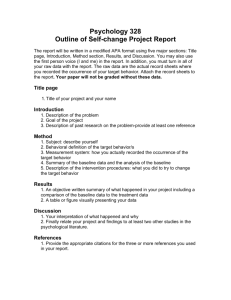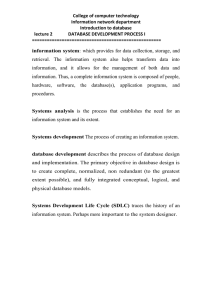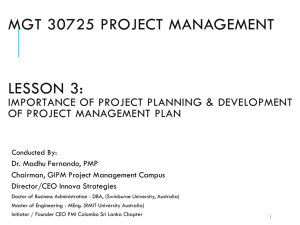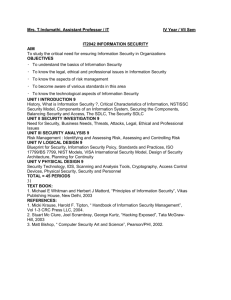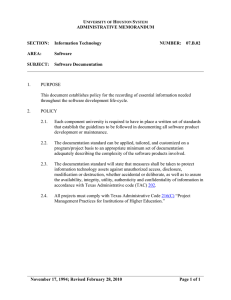U H S
advertisement
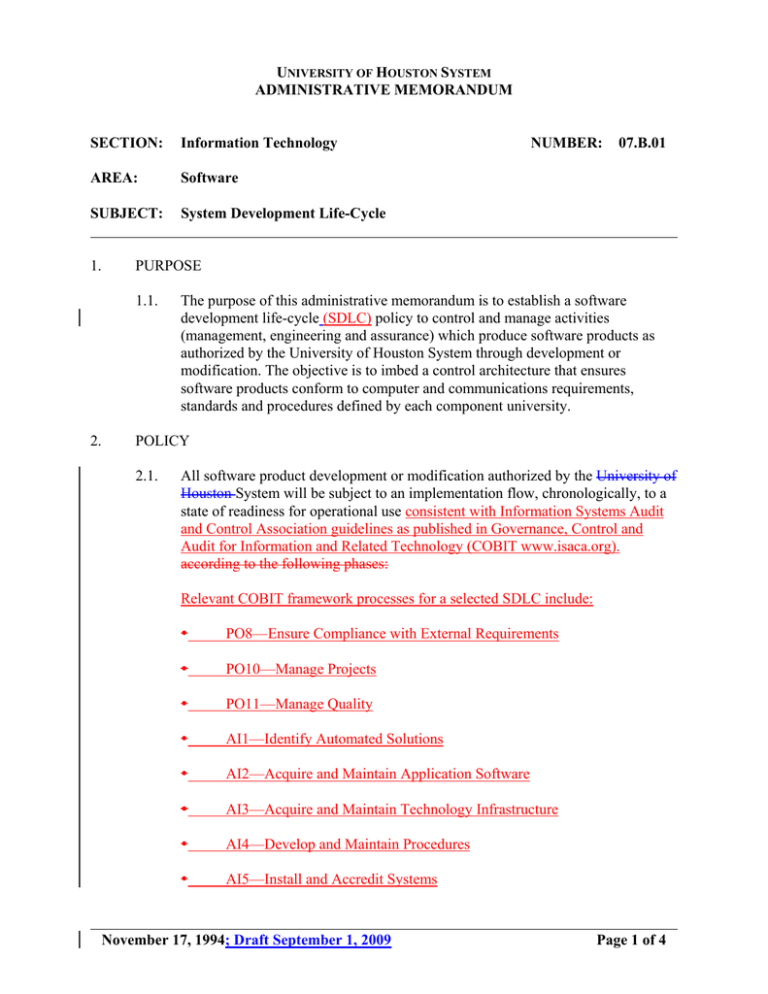
UNIVERSITY OF HOUSTON SYSTEM ADMINISTRATIVE MEMORANDUM SECTION: Information Technology AREA: Software SUBJECT: System Development Life-Cycle 1. 07.B.01 PURPOSE 1.1. 2. NUMBER: The purpose of this administrative memorandum is to establish a software development life-cycle (SDLC) policy to control and manage activities (management, engineering and assurance) which produce software products as authorized by the University of Houston System through development or modification. The objective is to imbed a control architecture that ensures software products conform to computer and communications requirements, standards and procedures defined by each component university. POLICY 2.1. All software product development or modification authorized by the University of Houston System will be subject to an implementation flow, chronologically, to a state of readiness for operational use consistent with Information Systems Audit and Control Association guidelines as published in Governance, Control and Audit for Information and Related Technology (COBIT www.isaca.org). according to the following phases: Relevant COBIT framework processes for a selected SDLC include: PO8—Ensure Compliance with External Requirements PO10—Manage Projects PO11—Manage Quality AI1—Identify Automated Solutions AI2—Acquire and Maintain Application Software AI3—Acquire and Maintain Technology Infrastructure AI4—Develop and Maintain Procedures AI5—Install and Accredit Systems November 17, 1994; Draft September 1, 2009 Page 1 of 4 AM No. 07.B.01 AI6—Manage Changes DS1—Define and Manage Service Levels DS2—Manage Third-party Services DS3—Manage Performance and Capacity DS4—Ensure Continuous Service DS5—Ensure Systems Security DS7—Educate and Train Users Concept and Initiation Requirements Architectural Design Detailed Design Implementation Integration & Test Acceptance & Delivery Sustaining Engineering & Operations 2.2. Throughout the SDLC, measures shall be taken to protect information assets against unauthorized access, disclosure, modification or destruction, whether accidental or deliberate, as well as to assure the availability, integrity, utility, authenticity and confidentiality of information in accordance with Texas Administrative code (TAC) 202. Each phase in the cycle will conclude with a corresponding formal transition review: Software Concept Review Software Requirements Review Preliminary Design Review Critical Design Review Functional Configuration Audit November 17, 1994; Draft September 1, 2009 Page 2 of 4 AM No. 07.B.01 Test Readiness Review Software Acceptance Review The transition review will be conducted by the product provider (the organization delivering the software capability) to report and document the set of activities executed in each phase. The report documentation will become the basis for the product acquirer's (the organization obtaining the software capability) approval. The approval, in turn, becomes the authority for the product provider to proceed to the succeeding phase. 2.3. Throughout the SDLC, measures shall be taken to comply with accessibility standards for institutions of higher education as described in the Texas Administrative Code (TAC) 213.Life-Cycle phase transition will be authorized only when agreement between the product acquirer and product provider defines a corresponding baseline for continuance: Management Baseline Allocated Baseline Design Baseline Code Baseline Integrated Baseline Accepted Baseline 3. 2.4. Selecting and adapting from the many SDLC frameworks in use is the responsibility of program/project management and shall be determined on a program/project basis.The baseline agreement will be documented by signature approval, by the product acquirer, of all required documentation for the LifeCycle phase. 2.5. Customization and use of this Life-cycle is the responsibility of program/project management and is to be determined on a program/project basis. REVIEW AND RESPONSIBILITY Responsible Party: Associate Vice Chancellor for Administration and FinanceInformation Technology and Chief Information Officer Review: in 1995 Every two years, on or before September December 1, beginning November 17, 1994; Draft September 1, 2009 Page 3 of 4 AM No. 07.B.01 4. APPROVAL Approved: Executive Vice Chancellor for Administration and Finance Alexander Schilt Chancellor Date: 5. November 17, 1994 INDEXING TERMS Life-Cycle Computer software November 17, 1994; Draft September 1, 2009 Page 4 of 4
